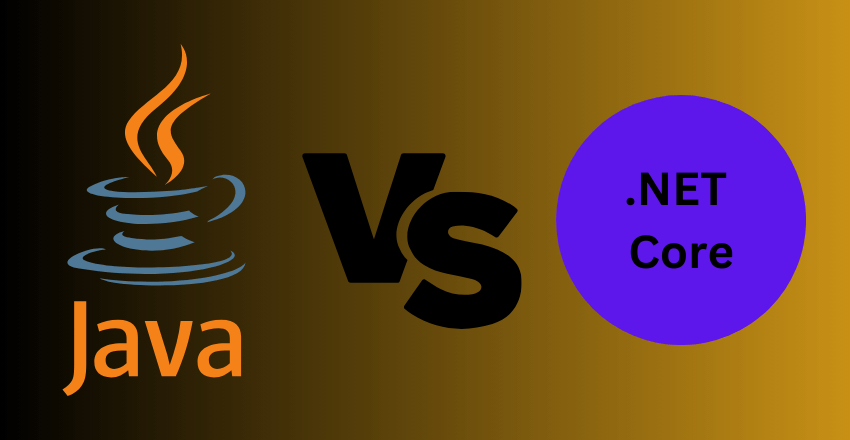
Java and .NET Core are both well-established programming languages and frameworks used worldwide for developing various applications. While Java is a class-based and object-oriented language, .NET Core is a cross-platform, open-source framework from Microsoft.
In this article, we will delve into the key features of Java and .NET Core, compare their performance, examine their use cases in various industries, and evaluate the ecosystems they each offer. We will also provide guidance to aid in your decision-making process when choosing between the two.
So, are Java and .NET Core similar? Let’s find out.
Introduction to Java and .NET Core
Java and .NET Core are two popular programming languages and frameworks used by developers around the world. They both have their own unique features, tools, and ecosystems that make them suitable for different types of projects and applications.
Java, developed by Sun Microsystems (now owned by Oracle Corporation), is an object-oriented programming language that is platform-independent and supports multithreading. It has been used for a wide range of applications, including desktop and mobile app development, enterprise software, and web applications.
.NET Core, developed by Microsoft, is a cross-platform open-source framework for building modern cloud-based applications. It offers performance optimization, a modern development toolset, and an extensive library of pre-built components and frameworks.
Both Java and .NET Core have large and supportive communities, and are constantly evolving through updates and new releases. Developers often choose between the two based on the specific needs and requirements of their projects.
Key Features of Java
Java is an object-oriented programming language that is platform-independent and can run on any system with a Java Virtual Machine (JVM). It is known for its ability to handle memory management automatically through garbage collection and supports multithreading, allowing multiple threads to execute concurrently.
Here are some of the key features of Java:
- Object-Oriented: Java is a pure object-oriented language, where everything is treated as an object with its own properties and methods.
- Platform-Independent: Java code can run on any system with a JVM, regardless of the underlying hardware and operating system.
- Garbage Collection: Java has an automatic garbage collection system that manages memory allocation and frees up unused memory, making it easier to write memory-efficient code.
- Support for Multithreading: Java’s support for multithreading enables concurrent execution of multiple threads, making it ideal for developing applications that require high performance and scalability.
Let’s take a look at an example of Java code:
// Defining a class in Java
public class HelloWorld {
public static void main(String[] args) {
// Printing “Hello World!” to the console
System.out.println(“Hello World!”);
}
}
This is a simple “Hello World!” program written in Java. It defines a class called “HelloWorld” with a main method that prints “Hello World!” to the console.
Overall, Java is a popular programming language used for developing a wide range of applications, from web and mobile applications to enterprise-level software.
Key Features of .NET Core
.NET Core, the open-source, cross-platform successor to the .NET Framework, offers several key features that make it a popular choice among developers and organizations. Let’s take a closer look at some of its notable features:
Cross-Platform Compatibility
One of the most significant advantages of .NET Core is its cross-platform compatibility, which allows developers to build and run applications on Windows, Linux, and macOS. This feature makes it easier for organizations to leverage their existing infrastructure and resources without having to make significant changes or investments.
Performance Optimization
Another key feature of .NET Core is its performance optimization capabilities. It offers improved runtime performance, faster startup time, and reduced memory usage compared to its predecessor, the .NET Framework. Additionally, .NET Core allows for the use of Ahead-of-Time (AOT) compilation, which can further improve application performance and reduce the overall application size.
Modern Development Tools
.NET Core also provides modern development tools that streamline the development process and help developers be more productive. It offers support for popular editors and IDEs, including Visual Studio Code, JetBrains Rider, and Visual Studio. Additionally, .NET Core supports a variety of programming languages, including C#, F#, and Visual Basic.
Extensive Libraries and Frameworks
Finally, .NET Core offers a vast selection of libraries and frameworks that make it easier for developers to build complex applications quickly. It includes libraries for file I/O, networking, cryptography, serialization, and more. Additionally, .NET Core supports several popular web development frameworks, including ASP.NET Core and Blazor.
| Feature | Description |
|---|---|
| Cross-Platform Compatibility | Allowing developers to build and run applications on Windows, Linux, and macOS. |
| Performance Optimization | Improved runtime performance, faster startup time, and reduced memory usage. |
| Modern Development Tools | Support for popular editors and IDEs, including Visual Studio Code, JetBrains Rider, and Visual Studio. |
| Extensive Libraries and Frameworks | Includes libraries for file I/O, networking, cryptography, serialization, and popular web development frameworks such as ASP.NET Core and Blazor. |
To illustrate some of these features, let’s take a look at some sample code in .NET Core. Below is an example of how to read a file in .NET Core:
// Import the necessary namespaces
using System;
using System.IO;// Define the file path
string filepath = “/path/to/file”;// Read the file contents
string fileContents = File.ReadAllText(filepath);// Display the file contents
Console.WriteLine(fileContents);
As you can see, the code is clean and straightforward, and the syntax is easy to read. This simplicity and ease of use are among the reasons why developers enjoy using .NET Core.
Performance Comparison
When it comes to performance, both Java and .NET Core have their strengths and weaknesses. It’s crucial for developers to understand these differences to choose the framework that best meets their specific needs.
In terms of execution speed, Java tends to be slower than .NET Core due to its Virtual Machine, which adds an additional layer of abstraction. However, recent updates to Java, such as the introduction of the GraalVM, have attempted to address this issue.
Memory usage can also be a factor in performance. While Java’s garbage collection feature can lead to higher memory usage, it also ensures that the code is more robust and error-free. On the other hand, .NET Core’s more limited garbage collection feature helps to keep memory usage low, but it requires developers to be more meticulous and precise with their code.
Regarding scalability, Java’s multithreading support allows it to handle large, complex systems with many threads, making it a preferred choice for enterprise-level applications. However, .NET Core’s performance optimization and cross-platform compatibility make it a versatile and flexible choice in other scenarios.
According to industry benchmarks and research, both Java and .NET Core have been shown to perform well in various environments. In the end, choosing between the two frameworks will depend on the specific needs and requirements of the project at hand.
Use Cases and Industry Trends
Both Java and .NET Core have a wide range of use cases in various industries and domains. Java, with its platform independence and support for multithreading, is frequently used for building enterprise applications, web applications, and Android apps. It is also commonly used for developing large-scale data-driven applications, such as those used in financial services, healthcare, and e-commerce.
.NET Core, on the other hand, is frequently used for building cross-platform web applications, mobile apps, and IoT devices. Its performance optimization and modern development tools make it a popular choice for building highly scalable applications that require speedy performance. .NET Core is also popular in the gaming industry, where it is used for building high-performance game engines.
In recent years, Java has remained a popular choice among enterprise-level organizations for its reliability and scalability. However, .NET Core is quickly gaining popularity in the enterprise space, primarily due to its cross-platform compatibility and modern development tools. In fact, a recent study found that 34% of enterprise developers are using .NET Core, with 45% planning to adopt it in the future.
Overall, the trend seems to be that Java is a more established language with a loyal following, while .NET Core is gaining traction among developers looking for a modern and versatile language. Both languages have extensive communities and support, making them excellent choices for a wide range of projects.
Comparison of Ecosystems
Java and .NET Core are two of the most popular programming languages and ecosystems available to developers today. When choosing between them, it is important to consider the differences in their respective ecosystems.
Java Ecosystem
The Java ecosystem has a large and active community of developers, with numerous resources available for learning and development. This includes extensive documentation, tutorials, and support forums. Java also has a massive library of third-party tools and frameworks, including popular options like Spring, Hibernate, and Apache Struts.
Java developers can take advantage of a wide range of testing tools, such as JUnit and Mockito. Additionally, Java has a strong presence in enterprise systems development, making it a popular choice for large-scale projects.
.NET Core Ecosystem
The .NET Core ecosystem is also very active, with a growing community of developers and a focus on modern development practices. It has extensive documentation, including Microsoft’s official documentation and a range of community-driven resources.
.NET Core is known for its extensive library of tools and frameworks, including popular options like ASP.NET Core, Entity Framework Core, and SignalR. It also offers a wide range of testing tools, such as xUnit and NUnit. Additionally, .NET Core is cross-platform compatible, making it a popular choice for developers working on projects for multiple platforms.
Comparing Ecosystems
While both Java and .NET Core have active and supportive communities, there are some differences to consider. Java has a longer history and larger community, making it easier to find resources and developers with experience in the language. On the other hand, .NET Core has a more modern and focused development approach, with an emphasis on cross-platform compatibility and modern development practices.
Ultimately, the choice between Java and .NET Core will depend on which ecosystem aligns better with your project requirements and development style.
Choosing Between Java and .NET Core
As a developer, the decision to choose between Java and .NET Core will depend on several factors. To make an informed decision, it is important to consider the project requirements, team expertise, community support, and future scalability.
When considering project requirements, Java may be a better choice for cross-platform development, while .NET Core may be better for Windows-based applications. In terms of team expertise, the choice may depend on the skills and experience of the team members.
Community support is also an important factor to consider. Java has a large and active community that produces extensive documentation and open-source resources. In contrast, .NET Core has a relatively smaller community but with strong backing from Microsoft and an increasing number of contributions from the open-source community.
Lastly, when considering future scalability, both Java and .NET Core offer features for building scalable and reliable applications. However, Java has a longer market presence and has proven performance in enterprise-level applications. .NET Core is still relatively new but is fast gaining popularity among developers.
In conclusion, the choice between Java and .NET Core will depend on the specific needs and preferences of the project and the team. Both languages and frameworks offer extensive features and capabilities for building robust applications. So, take the time to evaluate the project requirements, team expertise, community support, and future scalability to make an informed decision.
Final Thoughts and Conclusion
After assessing the similarities and differences between Java and .NET Core, it is clear that both programming languages and frameworks have their strengths and weaknesses. Java is known for its object-oriented nature, platform independence, garbage collection, and support for multithreading. On the other hand, .NET Core boasts cross-platform compatibility, performance optimization, modern development tools, and extensive libraries and frameworks.
When it comes to performance, both Java and .NET Core have their advantages and disadvantages depending on the specific use case. However, it is important to note that both have been widely adopted and used in various industries and domains.
The comparison of ecosystems reveals that Java and .NET Core have active and supportive communities, extensive documentation, and a plethora of available tools. However, individual developers or teams may find one ecosystem to align better with their project requirements and preferences.
Ultimately, the decision to choose between Java and .NET Core should be based on the specific needs and preferences of the developer or team. Factors such as project requirements, team expertise, community support, and future scalability should be considered.
In conclusion
Java and .NET Core are both popular programming languages and frameworks with their own unique features and benefits. By understanding their similarities and differences, developers can make an informed decision and choose the option that best fits their needs.
FAQ
Q: What is the purpose of this article?
A: This article aims to compare Java and .NET Core, providing insights into their similarities and differences to help developers make informed decisions.
Q: Why is comparing Java and .NET Core important for developers?
A: Comparing Java and .NET Core is important for developers because it helps them understand the strengths and weaknesses of each language and framework, enabling them to choose the one that best suits their project requirements.
Q: What is Java?
A: Java is a popular programming language known for its object-oriented nature, platform independence, and support for multithreading.
Q: What is .NET Core?
A: .NET Core is a cross-platform framework that allows developers to build modern applications. It offers performance optimization, modern development tools, and extensive libraries and frameworks.
Q: How does Java handle garbage collection?
A: Java has a built-in garbage collector that automatically manages memory, freeing up resources that are no longer needed by the application.
Q: Is .NET Core cross-platform compatible?
A: Yes, .NET Core is designed to be cross-platform compatible, allowing developers to build applications that can run on different operating systems.
Q: Are there any notable industry trends related to Java and .NET Core?
A: Yes, both Java and .NET Core have seen widespread adoption across various industries. Additionally, there is a growing trend of using Java for enterprise applications and .NET Core for modern web development.
Q: What factors should developers consider when choosing between Java and .NET Core?
A: Developers should consider factors such as project requirements, team expertise, community support, and future scalability when choosing between Java and .NET Core.
Q: What is the conclusion of this article?
A: In conclusion, Java and .NET Core have their own unique features and strengths. It is important for developers to assess their specific needs and preferences to make an informed decision on which language and framework to use.

Gordon is a distinguished technical author with a wealth of experience in software development, specializing in .NET C#. With a career spanning two decades, he has made significant contributions as a programmer and scrum master at prestigious organizations like Accenture and Boston Consulting Group, where he has played a pivotal role in delivering successful projects.
Since the release of .NET C# in 2001, Gordon’s passion for this powerful programming language has been unwavering. Over the past 20 years, he has honed his expertise in .NET C# development, exploring its vast capabilities and leveraging its robust features to create cutting-edge software solutions. Gordon’s proficiency extends to various domains, including web applications, desktop software, and enterprise systems.
As a technical author, Gordon remains committed to staying at the forefront of technological advancements, continuously expanding his skills, and inspiring fellow technologists. His deep understanding of .NET C# development, coupled with his experience as a programmer and scrum master, positions him as a trusted resource for those seeking guidance and expertise. With each publication, Gordon strives to empower readers, fuel innovation, and propel the field of scientific computer science forward.






